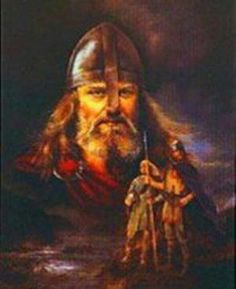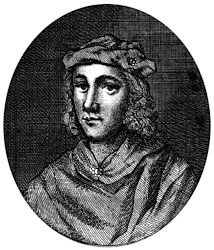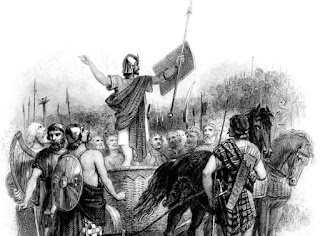Forgotten Folk
Forgotten folk
Close to the centre of Glasgow is a collection of early Scottish works of art, which attracts experts from around the world. It is a national treasure, as important as lona, yet its historical importance has been neglected by the city fathers and the tourist industry. So much so, that 16 priceless stone carvings were scooped up and dumped as rubble.
It seems incredible, but these symbols of our Christian heritage from more than a thousand years ago are virtually hidden, looked after by the minister and elders of Govan Parish Church.
Few people knew about them. And the reason appears to be simply that no one knows about the people who created them, the Britonic people, who were the first Glaswegians.
The belief is widely held that The when the Romans left Scotland, they turned off the lights, plunging us into centuries of barbarism known as the Dark Ages. Wrong.
This was the time when the Kingdom of the Scots started to take shape with the blending of differing nations and cultures. What is true is that most of their knowledge was passed down through the generations by the spoken word, and thus is lost to us.
But history doesn't stand still. Today we have increasingly sophisticated ways of recording, accumulating, and piecing together fragments of knowledge of that fascinating part of our past.
Tomorrow we shall know more.
James Tytler, for example, is largely unknown, now forgotten, but he was the first Briton to be airborne, designed, built, successfully flew, and safely landed a hot-air balloon in 1784. Later he edited the Encyclopedia Britannica.
A national hero? Not really. He was regarded as a hack who dabbled in science, and was driven from the country after criticising the Government.
No apologies for returning to the neglected Britons, who are the closest we have to 'native' Glaswegians.
As well as a priceless inheritance of literature, which we choose to ignore, we owe them many of the place names in the Central Belt.
Interestingly, their royal families gathered in Govan to worship.
This Celtic nation spoke Welsh, and their history was pure poetry, literally. Their bards' accounts of battles survive as our earliest known examples of written verse.
For those who know me, I will return to the subject of Glasgow and Glaswegians.












Comments
Post a Comment